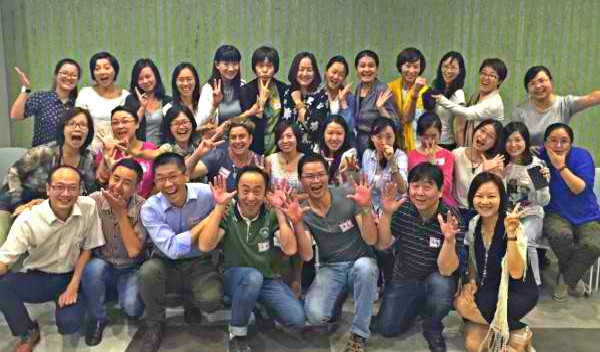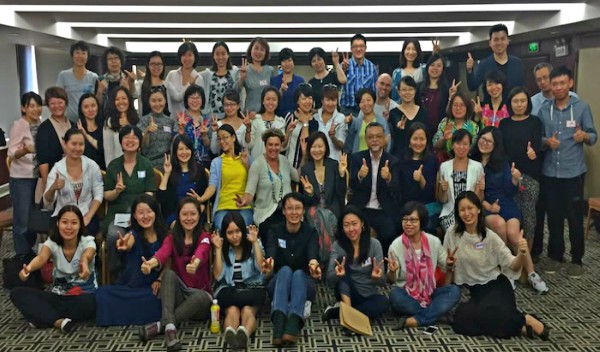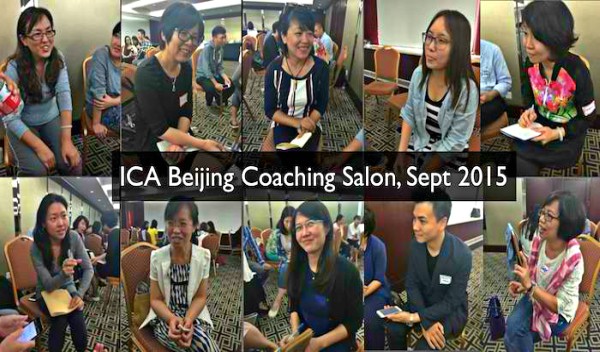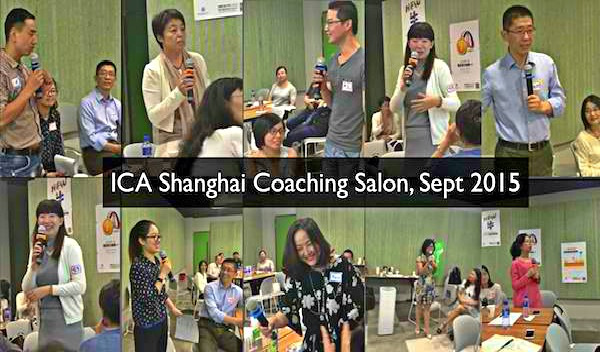Over 100 ICA Coaches from China – Coming Together to Deepen Their Coaching
It is always an incredible experience when ICA coaches get together in person. Since our training is online many of our students actually know each other very very well, yet have only met a handful of times, of at all. So the depth of connection at our live events is a really something special.
It is also always special to be in the presence of live coaching. It is not something we get to witness very often and is always valuable when we do.
Last weekend Viya Chen and I had the privilege of travelling to Shanghai and Beijing to conduct two intensive Mentor Coaching Workshops.
ICA Coaching Salon: Shanghai, September 12th, 2015
We were joined in Shanghai by Pinhsuan Chen and Qi Chen who both expertly assisted us to facilitate the learning.

ICA Coaching Salon: Beijing, September 13th, 2015
In Beijing we were fortunate to have Sheng-Min with Rachel Chen and Hua Wang as valuable support.
 (And of course neither of the workshops would have been possible without the continued support of the wonderful Echo Yu.)
(And of course neither of the workshops would have been possible without the continued support of the wonderful Echo Yu.)
Insights From the Mentor Coaching Workshops
We chose Mentor Coaching as our topic for this workshop for two key reasons:
- The ICF have placed an increased focus on Mentor Coaching as they continue to strive for excellence and quality in the delivery of coach training by Accredited Coach Training Providers (ACTP)
- The coaching field in general has reached a new stage of maturity. There are now many many certified coaches around the world. The challenge now is to deepen the experience of these coaches and assist them to take their coaching to a new level.
What is Mentor Coaching?
A Mentor coach is an experienced professional coach who observes and then provides feedback to a coach on their coaching competence as measured against the ICF Core Competencies. The feedback provided by a Mentor Coach should use targeted examples from the session so that:
a. The mentee will know exactly what s/he is doing well.
b. The mentee understands what needs to be done to develop a deeper level of mastery in coaching.
Insights & Coaching Tips
In both workshops we called for volunteer coaches and clients to hold a live coaching demonstration. These demonstrations were then used to observe and provide feedback on what the coaches did well and what they could have done better, using the ICF competencies as a framework. Here are some insights stemming from those demonstrations. (and a huge thank you to our coaches and clients for demonstrating such excellent coaching, allowing us all to learn)
1. Good Mentor Coaches Know How to Suspend Judgement
Giving effective feedback is a critical skill for a mentor coach. It is essential that the mentee coach is given both constructive and critical feedback. But often as humans (and coaches) we carry baggage around giving what could be perceived as “negative feedback”. ‘Negative’ and ‘Positive’ are not useful frameworks to use for giving feedback. If judgement is suspended then the feedback is neither positive or negative, it is just “useful” So whatever the coach mentee needs to know to improve their coaching should form the basis for the feedback.
One way to make sure you are delivering your feedback in a judgement-neutral way is to pay attention to your tone of voice. It should not be apologetic, or soft in any way, or carry any sense that you are uncomfortable about providing the feedback. Rather it should be direct and matter of fact.
 Move the Client past “the story”
Move the Client past “the story”
Sometimes clients are afraid to change, or they are so comfortable in their “story” that they keep returning to it no matter what questions you ask to try and shift them.
According to the ICF competencies the coach should “Go beyond what is said in assessing client’s concerns, not getting hooked by the client’s description.” And “Identify for the client his/her underlying concerns”
If you find your client is returning to their story over and over there are a few ways to gently challenge them. You might say:
I notice that you say you want this result (insert client’s goal) and yet you continue to go back to telling me the story. Shall we revisit your goal and make sure it is what you want
It is not right or wrong that the client is resisting, its possible that their stated goal is not actually what they want anyway. It could also be that they DO still want that goal but have an underlying belief getting in the way (I’m not good enough, I don’t deserve it, Im afraid etc.)
I understand your situation, and I’m aware we only have xx minutes left of this session. Would you like to brainstorm what could be getting in the way of you achieving your goal
You can use time as a tool to focus the client. Notice also the use of permission, a client is always more likely to stick with an action if they chose to undertake it in the first place.
Don’t “Over Paraphrase”
It is a good practice as a coach to make sure you and your client share the same understanding of the client’s issue. According to the core competencies, the coach should “Summarize, paraphrase, reiterate, and mirror back what the client has said to ensure clarity and understanding.” However it is important that you don’t overdo it. Too much paraphrasing and clarifying can slow a session down and get in the way of the client taking action.
I have noticed when observing coaching sessions that sometimes the coach replies on this technique too much. Possibly because it is one of the less difficult competencies, or possibly because they really want to make sure they understand.
 Have an Action for Every Session
Have an Action for Every Session
The ICF competencies state that the coach should
Clearly request of the client actions that will move the client toward his/her stated goals.
Not all clients require a defined action in every session, nonetheless is it good practice to get into the habit of closing your sessions off with an action step.
It is also useful for the client to think about what has been of most value to them during the sessions. Here are some sample questions:
What was the biggest take away for you from this session?
Did you learn anything new in this session?
What was most useful for you in this session?
And then to identify an action:
What is one action you can take this week to bring you closer to xxxx (insert goal discussed in session) Note, the action does not have to be physical, it can be thinking about something, talking to someone, reading something – anything that will shift the client closer to their goals.
The Client is in Control of the Session but the Coach is in Control of the Coaching
Finally, it is important to be strong and confident in your coaching.
As coaches we all know that one of the major distinctions between coaching and consulting or training is that the client is in control of the session. The client picks the topic, the client chooses their actions, the client must take responsibility for their own outcomes.
However, I have observed over the years that sometimes the coach allows the client to not only control the session but also control the coaching. It is true that the client chooses the topic for the session but it is your job as the coach to look past their story, push aside their fears, hold their vision out before them and not allow them to get in the way of their own greatness.